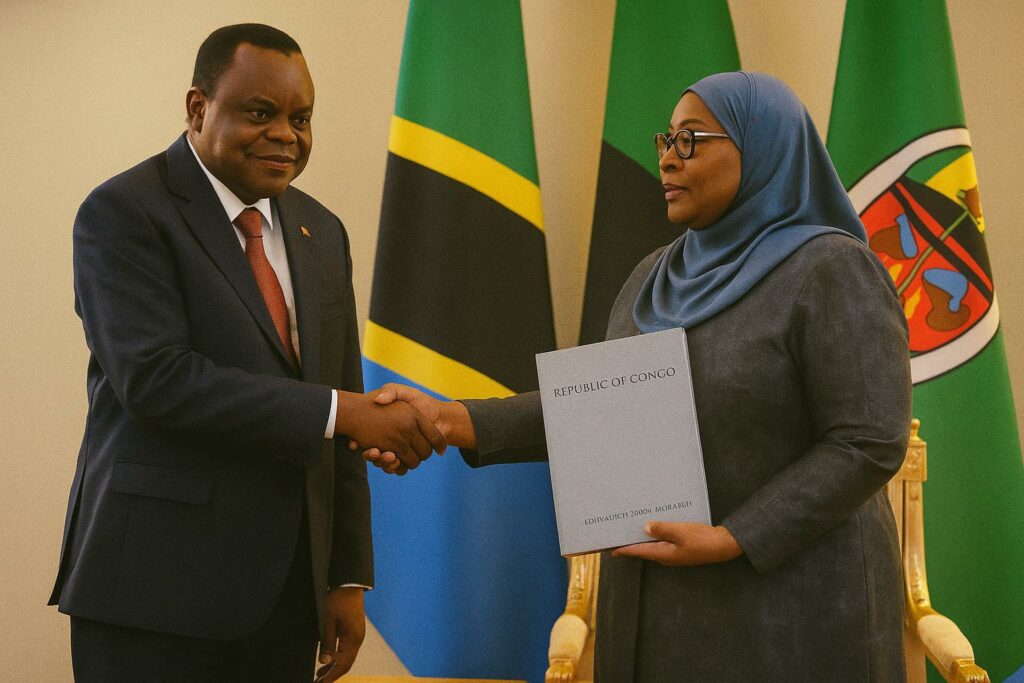Dar es Salaam Receives Brazzaville’s Envoy Ahead of 2025 UNESCO Decision
The July encounter between Congolese Foreign Minister Jean-Claude Gakosso and Tanzanian President Samia Suluhu Hassan unfolded with the measured choreography that often precedes a high-stakes multilateral ballot. Carrying a personal message from President Denis Sassou Nguesso, the minister placed Brazzaville’s principal diplomatic wager on the table: formal Tanzanian endorsement of Firmin Edouard Matoko’s candidacy for Director-General of the United Nations Educational, Scientific and Cultural Organization. While the vote will not occur until the forty-third General Conference in Samarkand in November 2025, early coalition-building remains decisive in UNESCO’s tradition of consensual politics.
Firmin Edouard Matoko: A Career at UNESCO Meets Diplomatic Calculus
The Congolese technocrat is no outsider to the institution he now hopes to lead. As Assistant Director-General in charge of Priority Africa and External Relations since 2018, Matoko has navigated a portfolio that bridges development cooperation and cultural diplomacy. His proponents argue that long stewardship of the Priority Africa agenda equips him to translate UNESCO’s universal mandate into tangible regional benefits (UNESCO Secretariat, 2023). In Dar es Salaam, Minister Gakosso framed the bid as “an African candidacy with Congolese colours”, underscoring that continental ownership of UNESCO’s future resonates with the African Union’s 2063 blueprint.
Tanzanian Health Leadership Resonates in Brazzaville
Reciprocity seldom stays far from diplomatic arithmetic. Brazzaville has just welcomed Professor Mohamed Yakub Janabi of Tanzania as the new Regional Director of the World Health Organization for Africa, headquartered in the Congolese capital. By congratulating Dar es Salaam on this appointment, President Sassou Nguesso signalled a willingness to underpin Janabi’s tenure with logistical and political support (WHO AFRO press release, 2024). In return, Tanzanian officials hinted that Matoko’s bid aligns with their own emphasis on elevating African expertise within global bodies. Such mutual reinforcement exemplifies a South-South dynamic that sidesteps the zero-sum perceptions sometimes attached to African diplomatic contests.
South-South Trade Corridors: From the Pointe-Noire Deep-Water Port to the Swahili Coast
The Gakosso–Suluhu Hassan dialogue did not confine itself to ballots and résumés. Discussions on air connectivity and maritime logistics pointed toward a broader commercial agenda. The Tanzanian flag carrier, already linking Dar es Salaam and Kinshasa, was invited to extend its network to Brazzaville. Congolese officials also expressed interest in harnessing Tanzania’s tourism expertise to diversify Congo’s post-hydrocarbon economy. According to African Development Bank data, bilateral trade presently lingers below 50 million USD annually, suggesting ample space for growth once transport bottlenecks ease.
Regional Multilateralism and the AfCFTA Overlay
Policy analysts in both capitals note that any Congo–Tanzania economic corridor will ultimately be judged against the architecture of the African Continental Free Trade Area. Integration of customs procedures between the Central African Economic Community and the East African Community remains uneven, yet the political symbolism of a Pointe-Noire–Dar es Salaam axis could galvanise private investment. In that sense, Matoko’s UNESCO bid serves as a diplomatic catalyst, weaving cultural diplomacy with hard-nosed commercial calculations under the umbrella of continental integration (AfCFTA Secretariat report, 2024).
Measured Optimism in the Halls of Diplomacy
Behind closed doors, Tanzanian diplomats concede that two full years separate Africa from the Samarkand vote—an eternity in multilateral time. Yet Minister Gakosso left Dar es Salaam with what he termed “a firm and entire assurance” of Tanzanian support. Matoko’s challenge now lies in persuading other electoral groups, particularly Latin America and Asia-Pacific, that an African director-general can advance UNESCO’s digital and educational reform agenda without falling prey to regional entanglements. The Congolese foreign ministry has scheduled comparable outreach in Brasília, Jakarta and Ottawa before year’s end. For Brazzaville, the road to UNESCO’s helm is thus as much a marathon of coalition-building as it is a showcase of Congo’s evolving diplomatic maturity. Whether this strategy culminates in triumph will become clear only under Samarkand’s autumnal skies, yet the early Tanzanian nod has undeniably placed Brazzaville on a path that combines soft-power ambition with pragmatic regional solidarity.

